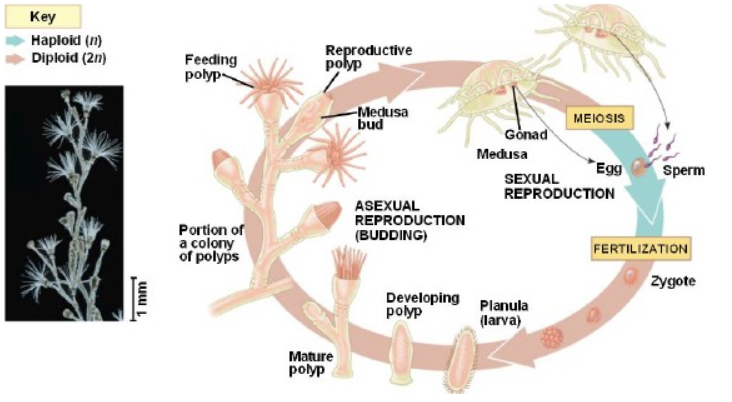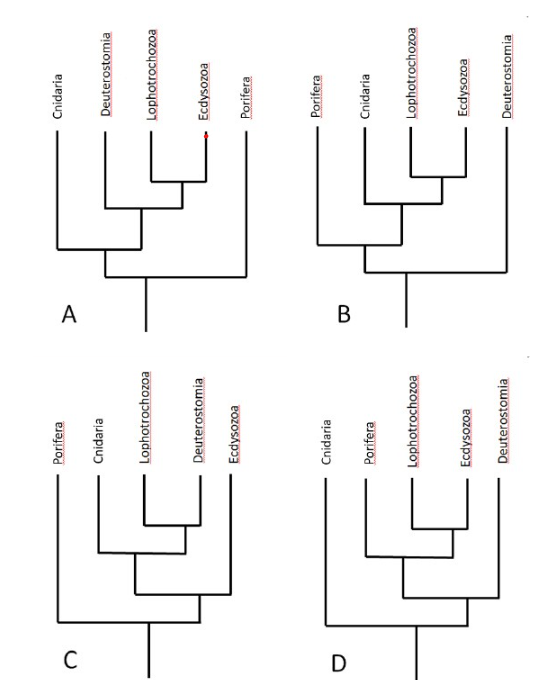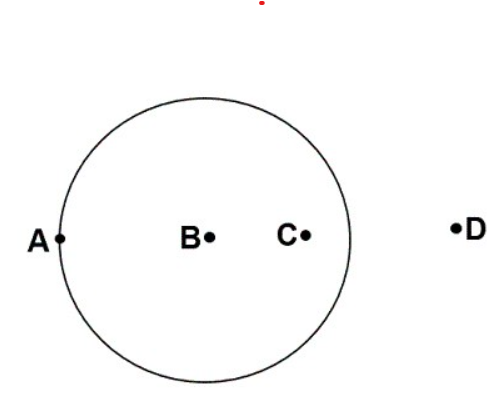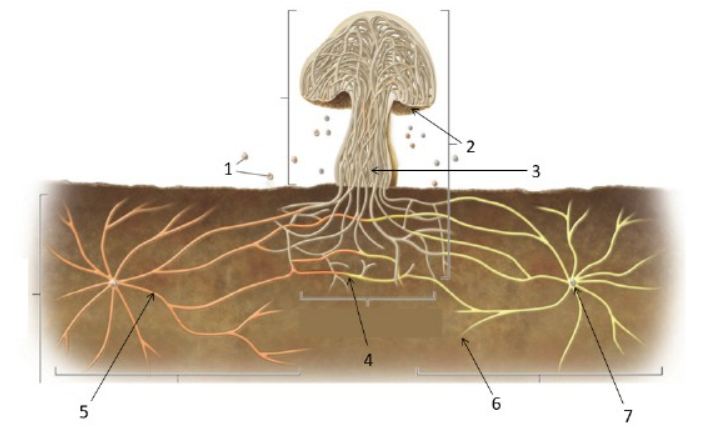BIO2 EXAM 3 CLICKERS AND PRACTICE TEST COMBO
1/106
There's no tags or description
Looks like no tags are added yet.
Name | Mastery | Learn | Test | Matching | Spaced | Call with Kai |
|---|
No analytics yet
Send a link to your students to track their progress
107 Terms
You find a population of terrestrial vertebrates living in the Atacama desert in Chile. Which adaptation would you most expect to find in these organisms?
Amniotic egg
Ophiuroidea, Asteroidea, Echinoidea and Scyphozoa all share the following trait
Adults display radial symmetry
You’ve come across a small, sessile organism sprouting from the ground. You’re not sure if you’ve found a fungus or a plant. Which of the following tests could help you determine this?
Chemically testing what the cell wall is made of.
A fungicide is released into an apple tree farm, and afterwards the trees in that patch grow slower than those located in other areas. What best explains what might have happened?
The fungicide killed the area’s mycorrhizal fungi.
According to the fossil record, Homo sapiens first arose in
Africa
Reptiles and mammals have . This allowed for the development of an amniotic egg which helps prevent .
internal fertilization…..desiccation of the embryo.
True muscle tissue and kidneys arise…
From the mesoderm in triploblastic animals only
Which of the following is/are common characteristic(s) of animals?
All of these answers are common characteristics of animals
You find a reptile-like vertebrate with the following characteristics
scales, four-chambered heart, ectothermy, and amniotic egg. To which group does this animal most likely belong?
Modern evidence suggests that Homo sapiens mated with members of this other species of hominin, which is shorter than Homo sapiens, has a larger brain, and originated in Europe
Homo neanderthalensis
You find a tetrapod, but can’t tell if it is actually a reptile or an amphibian. Discovering which of the following characteristics of the animal would be LEAST helpful in determining its identity?
That it is an ectotherm.
Which two organisms below are the most closely related to each other? 1Chimp, 2gorilla, 3new world monkey, 4emur, 5human
1 and 5
Which of the following is considered a likely explanation for the events of the Cambrian explosion?
Complex predator-prey relationships and increased atmospheric oxygen levels promoted animal diversification.
A student encounters an animal embryo at the eight-cell stage. The four smaller cells that comprise the top half of the embryo are directly above the four underlying cells. If we were to separate these eight cells and attempt to culture them individually, then what is most likely to happen?
Each cell may develop into a normal embryo that is a clone of the other seven cells
You find a homeothermic vertebrate that lays eggs. It could belong to one of which pair of groups?
birds or monotremes
A mushroom is
a structure with cells that have two copies of the genetic material.
Vertebrates and tunicates both have…
notochord
An aquatic predatory animal is a fast swimmer and chases prey through the ocean. Which of the following body plans would be most advantageous?
bilateral

This diagram represents the _ life cycle of a _.
Gametic, hydrozoan
Most of the growth at a fungal hyphal tip is accomplished directly through the mechanism of
Movement of water into the hyphae from the environment via osmosis.
All molluscs have a _
mantle

Which of the following phylogenetic tree of animals is accurate?
A
While scuba diving, your biology classmate was able to observe a marine animal that had a series of muscular tentacles that contain suckers that were connected to its head. According to your classmate, there was no shell or exoskeleton that could be observed, however he did remember a pair of large, fully developed eyes. Your classmate was able to observe an animal that belonged in which class?
Cephalopoda
Which of the following animals is NOT an ape?
Monkey
Which trait is found in ONLY ONE of these two groups
Chondrichthyans and Osteichthyans.
During chordate evolution, what is the sequence (from earliest to most recent) in which the following structures arose? 1. amniotic egg 2. vertebral column 3. Jaws 4. swim bladder 5. four-chambered heart
2, 3, 4, 1, 5

Below is a circular outline of a very old mycelium in a forest, as viewed from above, with four points labeled for this question, A-D. Which part of the fungus is the location where this mycelium most actively feeding and growing?
A
The water vascular system of echinoderms
functions in locomotion and feeding.
Rank the following traits in order of appearance in animal evolution 1. Bilateral symmetry 2. Cell specialization 3. Tissues 4. Endoskeleton
2, 3, 1, 4
You have a sponge in your new saltwater aquarium. Members of which of the following groups would be the best to try to feed to it?
Dinoflagellates
Which of the following animals is most closely related to Taylor Swift?
Sea star (Asteroidea)
Which of the following is NOT a characteristic of both animals and fungi?
rigid cells walls due to chitin layer
Which of the following statements about deuterostomes is true?
The first opening that forms during deuterostome gastrulation becomes the anus.
Cordyceps fungi infect insects in tropical forests and some Cordyceps species and other closely related species are able to affect the behavior of their insect host. For example Ophiocordyceps sinensis infects caterpillars that are hibernating in soil. Infection with O. sinensis causes the caterpillars to move to a vertical position, closer to the surface of the soil. After the caterpillar’s death, the fruiting body of the fungus emerges from the caterpillar body. Why would the characteristic of causing host caterpillars to have such behavior be advantageous, and selected for in cordycep fungi?
Because it increases spore dispersal
Your friend emails you for help with the identification of an elongated invertebrate that she has found in a moist forest in Africa. In her initial email, she describes the animal as having a complete digestive tract, a head, segmentation and appendages on each segment. You tell her that based on this information…
It could be an annelid or an arthropod. To be sure, you’d need to know whether the animal has a cuticle.
In both lichens and mycorrhizae, what does the fungal partner provide to its photosynthetic partner?
inorganic nutrients
Platyhelminthes can function without dedicated respiratory and circulatory systems because
none of their cells are far removed from the gastrovascular cavity or from the external environment

Below is a diagram of a fungus in a forest. Which of the following is true regarding the organism’s tissues at point 5?
This is multicellular haploid tissue.
Which of the following belongs to the lobe-fin clade?
horse
What was an early selective advantage of a coelom in animals? A coelom
contributed to a hydrostatic skeleton, allowing greater range of motion compared to organisms without body cavities
What are the cell walls of fungi primarily made of?
Chitin
Where is most of a mushroom fungus located?
Underground
In the sexual life cycle of fungi, where does plasmogamy occur?
In various parts of the life cycle
What are the two types of mating fungi called during sexual reproduction?
Donor & Recipient
What is a lichen?
A symbiotic association between photosynthetic organisms and fungi
What is the main benefit of mycorrhizal fungi to plants?
Increased nutrient and water acquisition
What unique feature helps identify an organism as a fungus?
Presence of chitinous cell walls
What characteristic behavior do ants infected with Cordyceps fungi exhibit?
Climb up vegetation before dying to allow the fruiting body to emerge
How many traits are typically found in most fungi?
3 traits: sessile, cell walls, and heterotrophic
Which of the following is NOT a typical characteristic of animals?
Rigid cell walls
During which geological period did a significant increase in animal phyla occur?
Cambrian period
What distinguishes animal heterotrophy from fungal heterotrophy?
Animals ingest matter before digestion
What type of symmetry do animals with radial symmetry exhibit?
Symmetry around a central axis
What can be said about an animal that is asymmetrical?
It is likely a sponge
What type of cleavage allows each cell to develop into a complete embryo?
Indeterminate cleavage
What is a hemocoel?
A body cavity that does not provide the benefits of a true coelom
What type of animal is most likely to have three germ layers and well-developed tissues?
Eumetazoan and bilaterally symmetrical
Which group contains the majority of animal species alive today?
Invertebrates
Which of the following is NOT a major clade of bilaterian animals?
Eumetazoa
Which of these traits is found in Cnidaria but not in bilateral animals?
They have two tissue layers
What is true about the Cnidaria's digestive process?
They are capable of extracellular digestion
What type of organism alternates between a medusa and a polyp?
A cnidarian
What type of respiratory system do Cnidarians have?
They breathe with their gills.
What is a defining feature of flatworms (Platyhelminthes)?
They are flat, which eliminates the need for respiratory and circulatory systems.
Which of the following has a gametic life cycle?
Jellyfish, sponge, coral, and sea anemone
What characteristic allows flatworms to have a more active predatory lifestyle?
Cephalization.
What is NOT a characteristic of Molluscs?
Internal bony skeleton.
Which statement about lophotrochozoans is NOT true?
A.They have indeterminate cleavage
B.They have bilateral symmetry
C.Most have a trochophore larva or a lophophore
D.Their mouth develops from the blastopore
A.They have indeterminate cleavage
What class of mollusks is characterized by a well-developed head and tentacles?
Cephalopoda.
What is the most defining characteristic of Ecdysozoans?
Molting.
Which characteristic is absent from nematodes?
Coelom.
What is NOT true about nematodes?
They are all parasitic.
Are arthropods the most diverse and abundant animals?
True.
What is the primary material of arthropod exoskeletons?
Chitin.
Which statement is NOT true of arthropods?
They have a closed circulatory system.
What is one difference between millipedes and annelids?
Only the millipede is segmented.
Do insects have lungs?
False.
Which characteristic is absent from echinoderms?
Bilateral symmetry in adults.
What organ is absent from echinoderms?
Brain.
What does the water vascular system of echinoderms function in?
Locomotion and feeding.
Which groups of invertebrates show clear segmentation?
Annelida and Arthropoda.
What characteristic is shared by all chordates?
Hollow nerve cord.
Which traits are found in vertebrates?
Hollow, dorsal nerve cord; Pharyngeal gill slits; Notochord; Post-anal tail.
What do hagfishes and lampreys have in common?
Lack jaws.
What does the name of the gnathostome clade refer to?
Jaws.
From what did jaws likely evolve?
Gill arches.
What do cartilaginous and bony fishes have in common?
Lateral line.
Which group of fishes is most closely related to tetrapods?
Lobe-finned fishes.
Which phyla are part of the Deuterostomia?
Chordata and Echinodermata.
Fungi are most closely related to
Animals
The animal kingdom is
Monophyletic
The protists most closely related to animals look like which of these?
choanoflagellate
What should animals with radial symmetry be better able to do than those with bilateral symmetry?
deal effectively with food distributed homogeneously in 360
Which of the following body cavity is INCORRECTLY defined? hemocoel—body cavity that forms between the ectoderm and the mesoderm coelom—body cavity that forms within the mesoderm compact—no body cavity
hemocoel—body cavity that forms between the ectoderm and the mesoderm
Which of these are sponges most likely to feed on?
Diatoms
Which characteristic is shared by both cnidarians and flatworms?
Lack of circulatory system (no gills or lungs)
Which tissue is usually derived from the mesoderm?
Muscles
Which is true of protostomes and not deuterostomes?
Their blastopore becomes their mouth.
While snorkeling a student observes an active marine animal that has a series of muscular tentacles bearing suckers. Tentacles are closely associated with its head and a pair of large well-developed eyes is evident. This animal belongs to which class of mollusks?
Cephalopoda
Which of the following is not an insect?
A scorpion